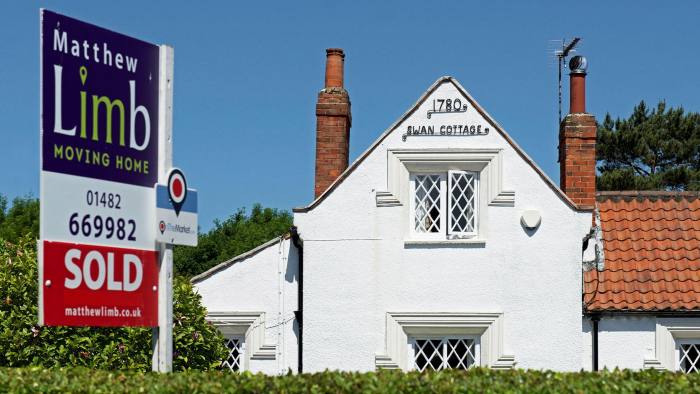UK house price growth reaches six-year high
01-01-2021
Stamp duty holiday and desire for more space boost demand but many expect prices to stall or fall in 2021

Larger and rural properties have proven more desirable in the working from home era, with city flats less in demand © Joe Doylem/Alamy
Delphine Strauss and George Hammond
UK house price growth reached a six-year high at the end of 2020 as people rushed to move to more spacious properties while government policy measures are still bolstering the market.
House prices rose 0.8 per cent between November and December taking the annual growth rate up from 6.5 per cent to 7.3 per cent, according to Nationwide Building Society’s index. This left prices 5.3 per cent above their March level when the pandemic struck the UK.
Price growth accelerated in all regions, with England outperforming Scotland and Northern Ireland — in contrast with the previous year, when prices in England barely rose at all over 2019. The strongest growth was in the East Midlands with London lagging behind, Nationwide’s figures showed.
“Housing market conditions have remained robust in recent months, even as the wider economic recovery lost momentum and the UK economy faced the prospect of further lockdowns and continued uncertainty about the UK’s international trading relationships,” said Robert Gardner, Nationwide’s chief economist.
The figures reflect a rush by white-collar workers to move to less cramped surroundings as working lives changed. Prices for detached houses have risen more than 8 per cent over the past year, compared with a much more modest increase of 4 per cent in prices for flats.
However government policy measures have so far protected the property market from the full force of the economic slowdown, with the furlough and self-employed income support schemes, along with mortgage holidays, preventing forced sales.
Meanwhile the introduction of a temporary stamp duty holiday in July led people to bring forward moving plans in an attempt to beat the end of the March deadline for its expiry. The holiday — which saves buyers up to £15,000 in property taxes — has stoked a rally in sales and an upturn in prices. House prices had been falling between April and June, according to Nationwide, but have since gained £14,500 on average.
Some economists warn that price rises are likely to stall or go into reverse next year as the stamp duty holiday comes to an end, unemployment increases and with income support schemes currently set to end in April.
Even bullish forecasts for 2021, such as that provided by property portal Rightmove, have price growth at around half the level experienced in 2020. Others, including the lender Halifax and the Office for Budget Responsibility, which independently produces the government’s forecasts, anticipate prices falling next year.
Samuel Tombs at consultancy Pantheon Macroeconomics said the end of the stamp duty threshold, together with a weaker labour market and a reduction in the premium placed on spacious housing once the pandemic was over, “all suggest that house prices will wobble”. But it is possible that the government will again step in to shore up the market, he added.

